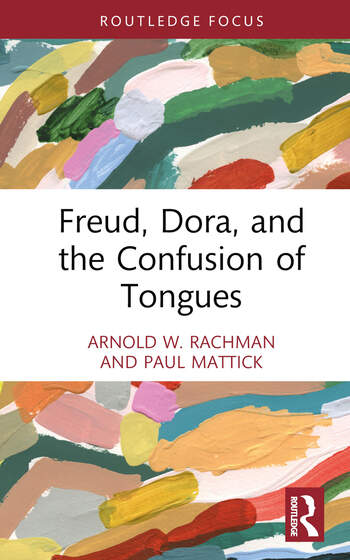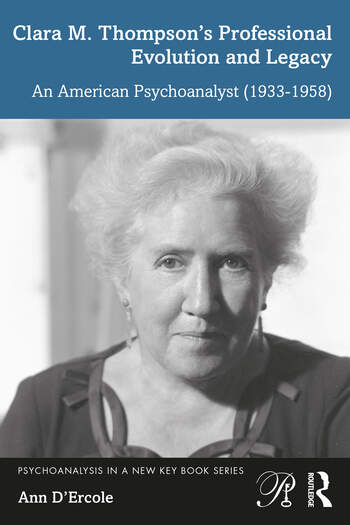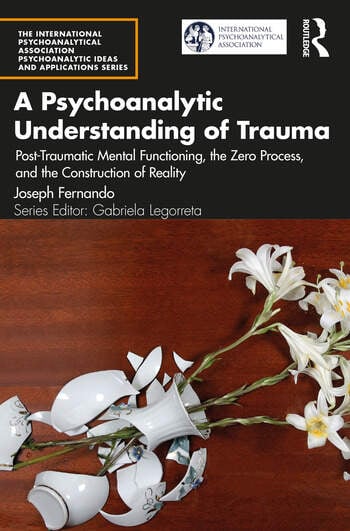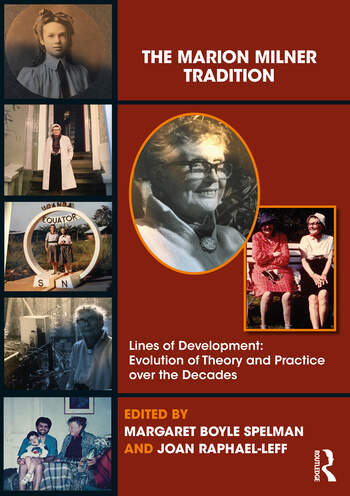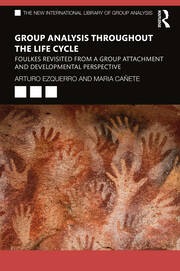Psychoanalysis Books
Freud, Dora, and the Confusion of Tongues
Responding to growing interest in issues of gender and power as they arise within psychoanalysis, Freud, Dora, and the Confusion of Tongues re-examines Freud’s iconic case of Dora from the... (more)
Clara M. Thompson’s Professional Evolution and Legacy: An American Psychoanalyst (1933-1958)
Beginning in 1933, after Sandor Ferenczi’s death, this volume draws extensively from interviews, personal correspondence, and scholarly essays to explore the latter part of Clara Thompson’s life and... (more)
Shandean Psychoanalysis: Tristram Shandy, Madness and Trauma
This unique book examines the psychoanalysis of madness and trauma through an extended discussion of The Life and Opinions of Tristram Shandy, Gentleman, the provocative eighteenth-century novel by... (more)
Relational Conversations on Meeting and Becoming: The Birth of a True Other
Demonstrating a relational, dialogic way of thinking and writing, this book offers an innovative perspective on the human potential for intersubjective engagement and on the nature of true... (more)
Psychoanalytic Work with Children in Hospital
Psychoanalytic Work with Children in Hospital presents the experiences of a psychoanalyst working within a hospital paediatric department.
It explores the possibilities for applying... (more)
Psychoanalysis and the New Rhetoric: Freud, Burke, Lacan, and Philosophy's Other Scenes
Psychoanalysis and the New Rhetoric: Freud, Burke, Lacan, and Philosophy's Other Scenes is an innovative work that places the fields of psychoanalysis and rhetoric in dynamic resonance with one... (more)
Prenatal Bonding Analysis: The Invisible Umbilical Cord
This book presents a novel psychoanalytic and psychotherapeutic method which enables expectant mothers to establish communication with their unborn babies.
After an exploration of the root... (more)
Patriarchy and Its Discontents: Psychoanalytic Perspectives
This anthology of interviews and essays joins luminaries in contemporary psychoanalysis with pioneers of feminism to provide a timely analysis of the crushing effects of patriarchy and the role that... (more)
Heteronormativity and Psychoanalysis: Oedipus Gay
Heteronormativity and Psychoanalysis proposes a critical reading of the Freudian and Lacanian texts that paved the way for a heteronormative bias in the theory and practice of... (more)
Grace Pailthorpe’s Writings on Psychoanalysis and Surrealism
This book gathers the published and unpublished writings of Dr Grace Pailthorpe (1883-1971), English surgeon, specialist in psychological medicine and surrealist artist to provide an in-depth study... (more)
From Fiction to Psychoanalysis: Reimagining a Relationship
How can reading literary fiction shed light on the way we speak ourselves within psychoanalysis? Rather than offering psychoanalytic insights into literature, Rosemary Rizq, a practicing psychologist... (more)
Critical Theory and Psychoanalysis: From the Frankfurt School to Contemporary Critique
Critical theory has traditionally been interested in engaging classical psychoanalysis rather than addressing postclassical thought. For the first time, this volume brings critical theory into proper... (more)
Après-coup in Psychoanalysis: The Fulfilment of Desire and Thought
This important book argues that après-coup, a concept that has blossomed in French psychoanalytic discourse, not only allows an understanding of how repressed early memories determine adult life, and... (more)
A Psychoanalytic Understanding of Trauma: Post-Traumatic Mental Functioning, the Zero Process, and the Construction of Reality
A Psychoanalytic Understanding of Trauma presents a theory of the nature of trauma and post-traumatic mental functioning based on the concept of the ‘zero process’.
Joseph Fernando presents a... (more)
Symbol Formation in Psychoanalysis
Marisa Pelella Mélega draws on a broad spectrum of clinical and observational work, gathered over many years as a practising and teaching psychoanalyst based in São Paulo, Brazil.
The role of... (more)
A Psychoanalytic Exploration of Social Trauma: The Inner Worlds of Outer Realities
A Psychoanalytic Exploration of Social Trauma presents a thorough introduction to social trauma from a range of perspectives, exploring several key themes, specific causes and symptoms and clinical... (more)
Psychoanalysis, the Self, and the World: Postphenomenology, Consciousness, and Death
This book takes psychoanalysis into the 21st century, examining issues of existentialism, postphenomenology, social media, and death and death anxiety that have gone largely ignored in the... (more)
Psychoanalysis and Other Disciplines Confront Prejudice: Discrimination Against the Other
Psychoanalysis and Other Disciplines Confront Prejudice: Discrimination Against the Other presents interdisciplinary perspectives on prejudice.
This book considers both the negative and positive... (more)
Metamorphoses of Psyche in Psychoanalysis and Ancient Greek Thought: From Mourning to Creativity
This unusual book explores the transformative power of liminal experiences in ancient Greek texts, psychoanalytic theory, and the author’s own life, to demonstrate how a contemporary understanding of... (more)
Inhabiting Implication in Racial Oppression and in Relational Psychoanalysis
What does it feel like to encounter ourselves and one another as implicated subjects, both in our everyday lives and in the context of our work as clinicians, and how does this matter?
With... (more)
Hidden Treasure: A Map to the Child's Inner Self
This classic edition of Violet Oaklander’s groundbreaking book presents her pioneering approach to engaging with children who enter therapy. A new introduction by Peter Mortola reflects on the ways... (more)
Psychoanalysis, Gender, and Sexualities: From Feminism to Trans*
Transcending the sex and gender dichotomy, rethinking sexual difference, transgenerational trauma, the decolonization of gender, non-Western identity politics, trans*/feminist debates, embodiment,... (more)
The Marion Milner Tradition
The Marion Milner Tradition provides a comprehensive overview of Milner’s eight-volume oeuvre for the first time, and celebrates her pioneering achievements both in psychoanalytic world and in... (more)
Sigmund Freud and The Forsyth Case: Coincidences and Thought-Transmission in Psychoanalysis
Sigmund Freud and The Forsyth Case uses newly discovered primary sources to investigate one of Sigmund Freud’s most mysterious clinical experiences, the Forsyth case. The book details Pierri’s... (more)
Occultism and the Origins of Psychoanalysis: Freud, Ferenczi and the Challenge of Thought Transference
Occultism and the Origins of Psychoanalysis traces the origins of key psychoanalytic ideas back to their roots in hypnosis and the occult.
Maria Pierri follows Freud’s early interest in... (more)
Psychoanalysis, Science and Power: Essays in Honour of Robert Maxwell Young
Psychoanalysis, Science and Power reexamines the current state of psychoanalysis and science and technology studies as they have been influenced by Robert Maxwell Young’s work.
Robert Maxwell... (more)
Psychoanalytic Perspectives on the Films of Ingmar Bergman: From Freud to Lacan and Beyond
Psychoanalytic Perspectives on the Films of Ingmar Bergman presents a contemporary Freudian-Lacanian assessment of this classic director. This collection is the first to bring together this unique... (more)
Group Analysis throughout the Life Cycle: Foulkes Revisited from a Group Attachment and Developmental Perspective
Arturo Ezquerro and María Cañete present a captivating journey through human development, group lives and group attachment from infancy all the way into old age. Co-constructed with meticulous... (more)
The Deconstruction of Narcissism and the Function of the Object: Explorations in Psychoanalysis
The Deconstruction of Narcissism and the Function of the Object addresses the topic of narcissistic suffering and presents an innovative take on its psychoanalytic treatment through the... (more)
Living and Containing Psychoanalysis in Institutions: Psychoanalysts Working Together
Encompassing diverse perspectives on the psychoanalyst as individual, social being, and member of psychoanalytic institutions, this book provides practical and informed answers to the question of how... (more)


